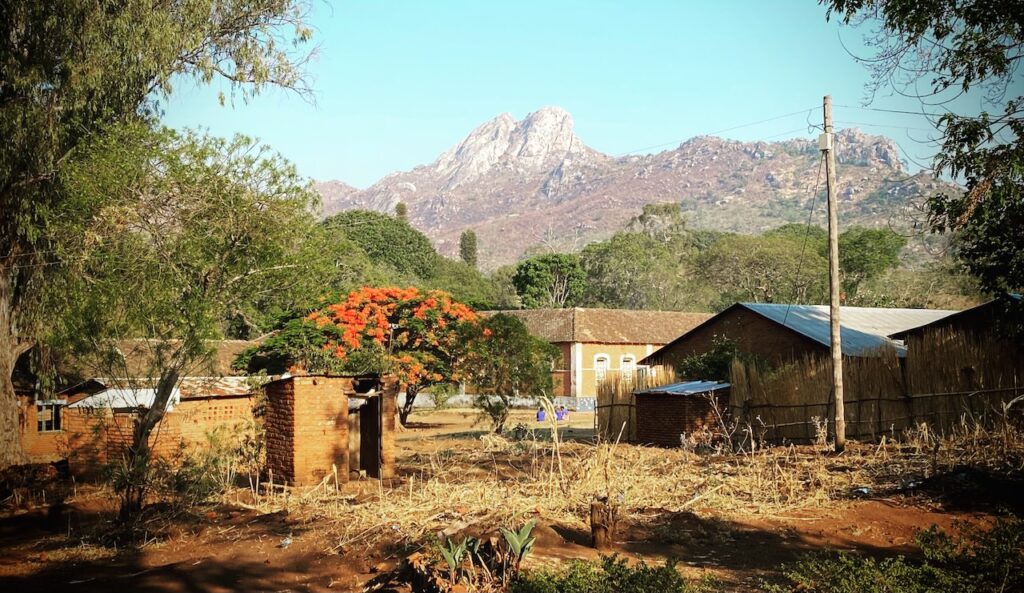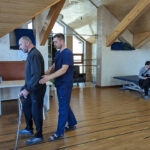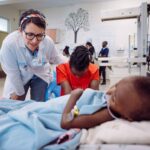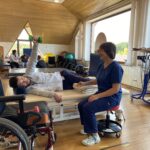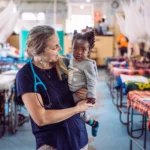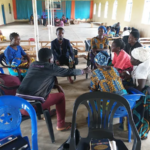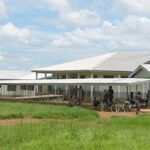Very Intentional
My forehead drips with sweat and the sun burns the back of my neck as I leave my gate and head to the hospital for the day. The past few days have been unbearable, but I am thankful for the little bit of wind that makes it feel slightly cooler, despite the dry dirt that sweeps up to attack my skin at the same time. The dry-hot season in central Malawi has arrived in full force.
As I navigate the uneven soccer pitch, littered with the leftovers from the cows, my mind goes back to the critically ill children and newborns my team cared for the day before. Their little bodies were so sick, and countless bad outcomes could have happened.
The prayer comes so easily.
God, please be with our team today and the sick children and their families. Help us to make the best decisions we can as a clinical team. Thank you for the little bit of wind.
Thank you for the healthy kids who run around me as I cross though their soccer pitch. Thank you that I do not have to commute to work on an interstate, and the only traffic is the family of monkeys that almost ran me over trying to get up the tree. Thank you for breakfast with my kids this morning, even though they woke up way too early. Amen.
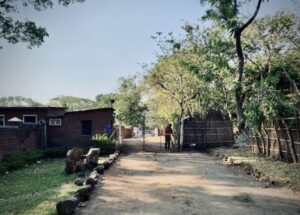 My 10 minute journey ends at the back hospital gate. I pull my sweat soaked polyester-cotton scrub shirt away from my back and put on my N-95. Though it makes me even hotter, I praise God again that our low-resource hospital has always been able to provide these since COVID-19 began in Malawi.
My 10 minute journey ends at the back hospital gate. I pull my sweat soaked polyester-cotton scrub shirt away from my back and put on my N-95. Though it makes me even hotter, I praise God again that our low-resource hospital has always been able to provide these since COVID-19 began in Malawi.
I step over the cut down limbs, sidestep a couple goats, and arrive 5 minutes later in the Pediatric Ward for the weekly ward meeting. I cross the open space and see two new kids looking very tired with oxygen tubing in their noses. One of the mothers is leaning over the bed, resting her head next to her small infant while the hospital chaplain prays over them both.
Lord, thank you for our wonderful chaplaincy team. They spend so much time caring for the emotional and spiritual needs of our families.
The 2 year old boy in the next bed jumps up and bounces down on his bottom with a loud squeal and giggle. I get close enough to laugh with him, and he freezes on the spot, but he still offers me a smile that warms my heart. Two day ago I watched him lay almost motionless in his bed close to death. He will move to the other end of the ward today, farther away from the nurses station, but it will open up his current trampoline for another critical child who needs close monitoring by our nursing staff.
The statistic board lets me know the trend of the last 24 hours.
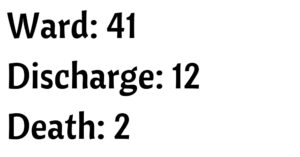
Seven years ago I would have seen 2 deaths and immediately tried to find out who it was and what exactly happened. Those things are still important to me today, but I push it aside for a moment to consider the number of patients who have gone home and how many have arrived.
Lord, thank you for 12 kids who got to go home yesterday. Thank you for the opportunity to serve 41 kids and their families today. Be with the families who are grieving the children they lost.
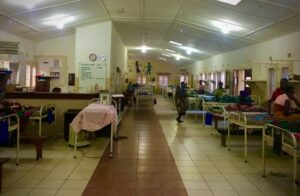 The main topics of the morning meeting are the pediatric deaths and challenging patients we had over the past week. Two patients are reviewed in detail by our team of clinicians and nurses. Honest assessments of things that need to be improved in our clinical choices and system are thankfully met with understanding and acceptance by our team, but most of all, commitment to do better.
The main topics of the morning meeting are the pediatric deaths and challenging patients we had over the past week. Two patients are reviewed in detail by our team of clinicians and nurses. Honest assessments of things that need to be improved in our clinical choices and system are thankfully met with understanding and acceptance by our team, but most of all, commitment to do better.
One child died from complications of congestive heart failure. So I step up to give a short impromptu lecture on diagnosis and emergency treatment for heart failure in critically ill children.
Lord, thank you for the hearts of our staff and learners. They want to improve their knowledge and improve the clinical system. Thank you that they are open to evaluate these extremely difficult cases that end in death so we can improve as a team.
A nurse nods to me to come check on a patient. The little one is working really hard to breath and the pattern is not regular. We spend two hours trying everything we can to help support her breathing, but it’s just not enough. The child died. We don’t have pediatric ventilators, not even the large government hospital in the capital has pediatric ventilators. The chaplains join us at the bedside to pray with the family. We pray for God to comfort them, thank God for keeping this child until they can be together again and praising him despite our pain and sadness.
The father looked at us and in his moment of overwhelming grief said, “Thank you for doing everything you could do for my child. Your team worked so hard.”
Lord, even though the outcome was not what we had hoped for, thank you for the way the nurses and clinicians worked together and communicated well to help this patient. It was good teamwork.
There are 8 more seriously ill children scattered around us, waiting for our clinical team to evaluate. As a sometime intimidating group of white coats, we move bed-by-bed down the line. Each child and their illness is teachable moment, so I take advantage of the real life example to teach my team about rheumatic heart disease, febrile seizures, and malaria.
There has been a steady flow into our ward of really sick children under the age of 5 with malaria. As the season begins, the number of children with seizures and in need of blood transfusions will increase from the deadly disease.
The last critical patient is sitting up in bed and off oxygen. His severe asthma attack the day before left him struggling to breathe and in need of oxygen to support his system while the medication worked to open up his lungs.
Lord, thank you that he is doing better this morning. The clinical learner managed the patient and the condition well. They used the things we talked about yesterday and helped this little boy. I give you praise for this.
After the long line of dangerously sick kids, I venture to the side of the ward full of laughter, screams (the good kind) and constant movement. These kids will be going home soon. Reviewing them helps me put things back into perspective. Most kids get better and go home.
I get a big smile and a high five from the first kid. Then they do a cute little 4-year-old dance move.
Lord, thank you for the healthy kids. Thank you that they can dance and that they can laugh when I try to dance too.
The next child hides behind his mother and I immediately slow down and approach him with caution. A little faces pops around the side of his mom and calls out “galu.” My entire team laughs and I cannot help but laugh too. I was never called a
“dog” by a patient in the USA. Since dogs are not usually pets here and are used for home security or are disease-filled stray who likely have rabies and will bite you, I try to not be too offended by his insult. I don’t blame him for calling me the scariest word he knows. It took a couple more days, but he warmed up a bit and stopped calling me dog when I came by to see him.
Lord, thank you for taking away his fear of me before he went. Thank you that he was able to go home.
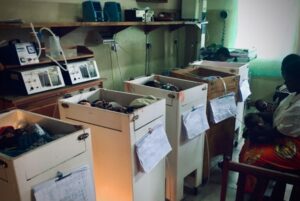 I begin my walk to the neonatal ward and prepare myself mentally for the upcoming temperate change. Despite the 90 degree weather, our premature babies still need heaters to keep them warm. The blast of heat when I open the door makes the walk to work feel pleasant. It’s just downright hot.
I begin my walk to the neonatal ward and prepare myself mentally for the upcoming temperate change. Despite the 90 degree weather, our premature babies still need heaters to keep them warm. The blast of heat when I open the door makes the walk to work feel pleasant. It’s just downright hot.
There were two deaths overnight. Malawi has one of the highest prematurity rates in the world, and we don’t have ventilators for newborns (neither does the large government hospital in the capital) or surfactant (a chemical to help keep the baby’s airways open).
A mother holds a tiny infant and feeds her milk with a small cup. The baby is no longer on oxygen, and I know we will be able to move them to Kangaroo Care soon.
Lord, thank you for this warm place to take care of so many preterm infants. Thank you for our IV pumps and our CPAP (continues positive airway pressure) machines that help so many of our babies breath.
The walk to Kangaroo Care is noisy, especially since its located in the middle of the maternity unit, but there is a calm that is special to this room. Half the beds are full of mothers wrapped in sheets that hold their tiny baby to their chest. The warmth of mom’s body passes skin-to-skin to the baby keeps the baby warm and makes breastfeeding easier.
Like a kangaroo keeps their baby in their pouch until it’s ready to be outside, Kanagroo Care is a unit dedicated to assisting mothers and premature babies until the little one is big enough to safely go home. We review one baby who weighed almost 2 lbs when she was born. She has been in the unit for two months, but still has some more growing to do.
Lord, thank you that this baby is growing and feeding well. Thank you that he is a fighter. I praise you that he has survived. Thank you for his amazing mom who has been here everyday taking care of her little one so that he can grow and go home soon.
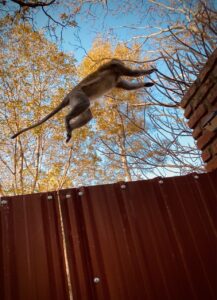 My walk home for lunch is littered with monkeys and children. The monkeys throw rocks as me as I pass under their tree. Luckily it misses. I decide to not cross the soccer pitch now overrun with kids from the primary school that is on break. Some play soccer with a ball made of rolled up plastic bags and rubber strips binding it together. It bounces remarkably well. The older girls play a game that looks like jumprope but te rope doesn’t move, and the youngest ones run around and laugh at me as the yell “Hello mzungu.” (mzungu = white person, non-Malawian, foreigner, etc.)
My walk home for lunch is littered with monkeys and children. The monkeys throw rocks as me as I pass under their tree. Luckily it misses. I decide to not cross the soccer pitch now overrun with kids from the primary school that is on break. Some play soccer with a ball made of rolled up plastic bags and rubber strips binding it together. It bounces remarkably well. The older girls play a game that looks like jumprope but te rope doesn’t move, and the youngest ones run around and laugh at me as the yell “Hello mzungu.” (mzungu = white person, non-Malawian, foreigner, etc.)
 I make it through my gate and get rushed by my 70 lb chocolate lab. He and I disagree on his future as a lap dog, but his tails goes crazy and he plops on my feet for a belly rub. My daughter and son yell, “Hi dad,” through the windows and I know they must be standing on the table again. I cannot wait to ask my daughter what her mom taught her in school this morning and what new words my two-year-old son has managed to master today. My favorite so far is “Brockington” with surprisingly clear syllables.
I make it through my gate and get rushed by my 70 lb chocolate lab. He and I disagree on his future as a lap dog, but his tails goes crazy and he plops on my feet for a belly rub. My daughter and son yell, “Hi dad,” through the windows and I know they must be standing on the table again. I cannot wait to ask my daughter what her mom taught her in school this morning and what new words my two-year-old son has managed to master today. My favorite so far is “Brockington” with surprisingly clear syllables.
Lord, thank you for letting me come home and eat lunch with my family.
Lunch ends too soon and I pack up for the even hotter walk back to the hospital. Sweat drips down my neck even as I put on my shoes and the I know my metal gate will burn my fingers on contact. I cling to the fact that the temperature will cool down in a few hours.
My afternoon is a simplified version on my morning as I review old patients and new ones with the clinical team. My Family Medicine resident and I discuss epilepsy today and I am thrilled that my clinical officer plans to join in on the learning time. I love teaching and helping mentor the learners to give better care for their pediatric and neonatal patients.
Lord, thank you for this time and the chance to spend it with these clinical learners.
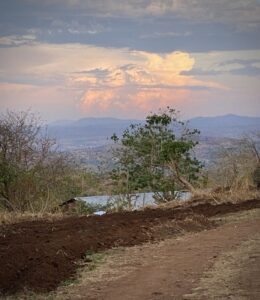 The walk home is definitely the least hot (almost cool) part of my day. My kids run around the yard screaming and chasing the dog and my wife sits on our steps with a smile on her face. She is back from work too and cherishes the happy screams and laughter of our family as much as I do.
The walk home is definitely the least hot (almost cool) part of my day. My kids run around the yard screaming and chasing the dog and my wife sits on our steps with a smile on her face. She is back from work too and cherishes the happy screams and laughter of our family as much as I do.
Lord, thank you for my home and my healthy family. Thank you for my wife who loves God, loves me, and loves our family. Thank you that she is here today when I came home. Some days are really tough, and I am glad that You have given us each other, so that we can love and support one another not only as spouses but as physicians.
One of the questions that I get asked the most is, “How do you deal with all the difficult pediatric cases, decisions, and death working in a low-resource setting?”
My constant exposure to so many suffering and dying children is not easy. There are many wonderful people, missionaries and non-missionaries, who come to a setting like ours and do not have the capacity to cope with the volume of childhood death and illness we encounter everyday. I have a theory it is one of the reasons why there are so few pediatricians in rural Africa.
It’s extremely hard and for the first two years in Africa I didn’t know if I would be able to deal with it in a healthy way.
On of the most important things that has helped me is being intentionally thankful throughout the day. I take a second to praise God in the moment of something hard, or use my phone to write a quick note of gratitude for a blessing He has given me.
Giving thanks throughout out the day helps me to stay focused on the present and to not worry about the things I cannot control. I cannot effect what happened overnight in the ward or what will happen in the hours after I go home. Yet, thanking God for simple things like the wind or a smiling child helps me to focus on the present and how God wants to use me in that moment.
Over time this has helped me find a closer relationship with God and to give the control over to Him. Being intentionally thankful has humbled me as I put more of a focus on the Giver, not the gift. Gratitude has brought me contentment and more joy. I can see not only how God works in small ways but in big ones as well. Over time, gratitude and thanksgiving has brought me more peace and less anxiety throughout the day.
Are some days still extremely hard? Absolutely. Some days are horrible and Satan lies build up. Some days are filled too much anxiety, worries, and stress. Choosing to be intentional about giving thanks, even if they are brief moments has helped give me peace and quiet Satan’s voice.
Thanksgiving is one of my favorite season of the year. I have a lifetime of good memories with family and friends. I love this time with my family, good southern food, and watching the Cowboys, whether they won or lost.
However, I really loved the overall attitude of thanksgiving and the time we take to reflect and be thankful. Thanksgiving and gratitude were important to me growing up, however it was not something I thought about on a daily basis. It is now a daily weapon I use against the darkness here, and one of the things that has kept me on the mission field as a physician and will continue to keep me on the field.
Even though the weather outside does not feel like Thanksgiving here, I am grateful for this time of the year anyway. Our family wishes yours a Happy Thanksgiving! Eat some pecan pie, dressing, and turkey for us. We look forward to seeing many of you soon.
Seven years ago today, we had a church moving sale to sell most of our things before moving to Africa. Many have supported us financially and through prayer since then, and we are grateful. Thank you to all those who have given over the past seven years and those who continue to donate. We would not be able to serve without this continued financial support. You are the reason we are able to serve the underserved and mentor young Malawian clinicians.
Please partner with us in our healthcare ministry through prayer and by donating. We depend on monthly recurring donations and one-time gifts. We need to raise $60,000 in one-time gifts by the end of 2021 for 2022. Give today, so we can continue to teach, encourage and serve our Nkhoma community as Christian physicians.
